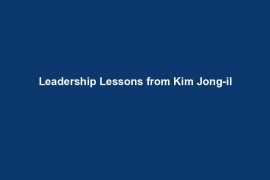Hey there, have you ever wondered what makes a leader like Kim Jong-un tick? I mean, the guy has been running North Korea with an iron fist for quite some time now, and his leadership style is definitely… unique, to say the least. In this blog post, we’re going to delve into the world of authoritarian rule and explore the lessons we can learn from studying Kim Jong-un’s leadership.
Now, you might be thinking, Why should I care about some dictator on the other side of the world? Well, here’s the thing – understanding how authoritarian leaders like Kim Jong-un operate can actually give us some valuable insights into leadership dynamics in general. Whether we’re talking about a small team at work or a big organization, the principles of leadership still apply.
So, what can we actually learn from Kim Jong-un’s leadership style? Well, for starters, the guy has certainly mastered the art of creating a cult of personality. I mean, have you seen all those grandiose statues and propaganda posters of him plastered everywhere in North Korea? It’s like he’s the chosen one or something. But hey, it seems to work for him in maintaining his power.
And let’s not forget about the whole hierarchy and control thing. Authoritarian leaders like Kim Jong-un thrive on fear and repression to keep their people in line. It’s a pretty ruthless way to govern, but hey, it gets the job done, right?
But here’s the kicker – lack of accountability. When a leader has unchecked power and zero consequences for their actions, it can easily lead to corruption and all sorts of shady dealings. And let’s just say Kim Jong-un hasn’t exactly been known for his transparency and ethical behavior.
Lastly, we can’t ignore the impact of international diplomacy on Kim Jong-un’s leadership. The guy’s relationships with other countries have definitely been… complicated, to say the least. But hey, that’s the price you pay for being an authoritarian leader, I guess.
In the next sections of this post, we’ll explore how these lessons from Kim Jong-un’s leadership can be applied to other contexts, reflect on the importance of transparency and accountability in leadership, and encourage leaders to strive for environments based on trust and respect. So, buckle up and get ready to dive into the intriguing world of authoritarian leadership!
Cult of Personality
One of the key lessons we can learn from Kim Jong-un’s leadership is the power of cultivating a cult of personality. Just like celebrities have adoring fans, Kim Jong-un has used his image and propaganda to create a sense of awe and reverence among the North Korean people. His carefully crafted persona as a strong, charismatic leader has been instrumental in maintaining his grip on power.
Strict Hierarchy and Control
Authoritarian leaders like Kim Jong-un rely on strict hierarchy and control to keep their populace in check. By instilling fear and using repression tactics, they ensure obedience and loyalty from their subjects. This lesson shows us the dark side of leadership, where power is wielded through intimidation and manipulation.
Lack of Accountability
Unchecked power and corruption are rampant in authoritarian regimes, and North Korea is no exception. Kim Jong-un’s leadership style demonstrates how a lack of accountability can lead to abuse of power and a disregard for the well-being of the people. It serves as a cautionary tale of what happens when leaders are not held responsible for their actions.
International Diplomacy
Kim Jong-un’s leadership has also had a significant impact on North Korea’s relationships with other countries. His aggressive stance on nuclear weapons and provocative actions have strained diplomatic ties and heightened tensions on the world stage. This lesson reminds us of the importance of diplomacy and dialogue in maintaining peace and stability in the global community.
By studying Kim Jong-un’s leadership, we gain valuable insights into the complexities of authoritarian rule and its implications for both domestic and international politics. These lessons serve as a stark reminder of the dangers of unchecked power and the importance of fostering transparency, accountability, and ethical leadership in all types of organizations. As leaders, it is our responsibility to reflect on our own leadership styles and strive to create environments based on trust, respect, and collaboration. Only then can we truly inspire and empower those we lead.
Implications for Leadership Beyond North Korea
Now that we have delved into Kim Jong-un’s leadership style and the key lessons learned from studying his rule, it’s time to explore how these insights can be applied beyond the borders of North Korea. The leadership dynamics we’ve discussed can actually provide valuable lessons for leaders in any organization, whether it be a business, non-profit, or governmental institution.
Transparency, Accountability, and Ethical Leadership
One of the most important takeaways from examining Kim Jong-un’s leadership is the importance of fostering transparency, accountability, and ethical leadership in all types of organizations. When leaders operate in secrecy, avoid taking responsibility for their actions, and engage in corrupt practices, it creates a toxic environment that erodes trust and stifles collaboration. By striving for transparency, holding ourselves accountable, and leading with integrity, we can build stronger, more resilient organizations that prioritize the well-being of their members.
Reflecting on Our Own Leadership Styles
After reading about Kim Jong-un’s leadership, it’s a good time to take a moment to reflect on our own leadership styles. Are we fostering a culture of openness and trust within our teams? Do we hold ourselves accountable for our decisions and actions? Are we leading with integrity and ethical principles? By asking ourselves these questions and making a conscious effort to improve our leadership practices, we can create environments that are based on trust, respect, and collaboration.
Call to Action
I urge all leaders, whether you’re leading a small team or a large organization, to take stock of your leadership style and strive to embody the qualities of transparency, accountability, and ethical leadership. By doing so, we can create positive change within our organizations and inspire those around us to do the same. Let’s work together to build a world where leadership is defined by integrity, trust, and collaboration.
Remember, leadership is not just about holding power—it’s about using that power to inspire, uplift, and make a positive impact on those around you. Let’s strive to be the kind of leaders that others want to follow, not because of fear or force, but because of respect, trust, and a shared vision for a better tomorrow.


